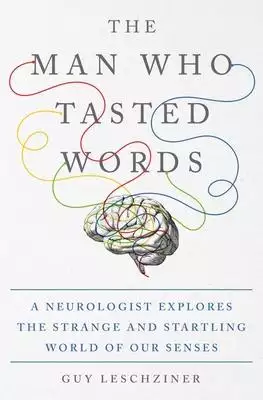Out of touch meaning的問題,透過圖書和論文來找解法和答案更準確安心。 我們找到下列包括價格和評價等資訊懶人包
Out of touch meaning的問題,我們搜遍了碩博士論文和台灣出版的書籍,推薦Leschziner, Guy寫的 Betrayed by the Brain 和Radtke, Kristen的 Seek You: A Journey Through American Loneliness都 可以從中找到所需的評價。
這兩本書分別來自 和所出版 。
中國文化大學 政治學系 林炫向所指導 盧俊昇的 情緒對外交決策之影響:以韓戰期間的中共與美國為例 (2021),提出Out of touch meaning關鍵因素是什麼,來自於情緒、情緒轉向。
而第二篇論文世新大學 傳播研究所(含博士學位學程) 蘇建州所指導 羅婧婷的 媒介化視域下的互動影像研究 (2021),提出因為有 媒介化、互動影像、媒介邏輯、傳播形定的重點而找出了 Out of touch meaning的解答。
除了Out of touch meaning,大家也想知道這些:
Betrayed by the Brain

為了解決Out of touch meaning 的問題,作者Leschziner, Guy 這樣論述:
In The Man Who Tasted Words, Guy Leschziner leads readers through the senses and how, through them, our brain understands or misunderstands the world around us.Vision, hearing, taste, smell, and touch are what we rely on to perceive the reality of our world. Our senses are the conduits that bring
us the scent of a freshly brewed cup of coffee or the notes of a favorite song suddenly playing on the radio. But are they really that reliable? The Man Who Tasted Words shows that what we perceive to be absolute truths of the world around us is actually a complex internal reconstruction by our min
ds and nervous systems. The translation into experiences with conscious meaning--the pattern of light and dark on the retina that is transformed into the face of a loved one, for instance--is a process that is invisible, undetected by ourselves and, in most cases, completely out of our control. In T
he Man Who Tasted Words, neurologist Guy Leschziner explores how our nervous systems define our worlds and how we can, in fact, be victims of falsehoods perpetrated by our own brains. In his moving and lyrical chronicles of lives turned upside down by a disruption in one or more of their five senses
, he introduces readers to extraordinary individuals, like one man who actually "tasted" words, and shows us how sensory disruptions like that have played havoc, not only with their view of the world, but with their relationships as well. The cases Leschziner shares in The Man Who Tasted Words are e
xtreme, but they are also human, and teach us how our lives and what we perceive as reality are both ultimately defined by the complexities of our nervous systems.
Out of touch meaning進入發燒排行的影片
I made a large fresh Daifuku filled with frozen "Petit Daifuku" (1kg!) from the Gyomu Supermarket.I used matcha green tea flavored fresh cream, so I never get tired of eating it. This is not a birthday cake, but a birthday Daifuku for someone who loves Japanese sweets! I want to give a big fortune ( Meaning of Daifuku ) and impact.
*Recipe* (for one 17cm diameter bowl)
1.Mix 6g of matcha, 40g of sugar and 40ml of fresh cream in a bowl over hot water.Matcha is less likely to get lumpy once it is sifted.
2.Pour 360ml of fresh cream into a bowl and add the cooled (1).
3.Cool the bottom of the bowl with ice water and whisk until stiff.
4.Spread out the plastic wrap in a 17cm diameter bowl.
5.Layer (3) with the petite daifuku. I used 25 pieces of petite daifuku.
6.Place in the freezer to cool and harden.
7.In a heatproof bowl, mix together 150g of joshinko (rice flour) and 60g of sugar.
8.While mixing, add 165g of lukewarm water, a little at a time, keeping an eye on it. I added a little less than 150g this time.
9.Wrap it softly and heat it in a 600w microwave for 2 minutes and 30 seconds.If any whitish areas remain, mix them briefly and heat while watching the situation.This time, it was additionally heated twice for 30 seconds and 20 seconds.
10.Pound the mixture with a wet pestle until it becomes smooth.
11.When it is cool enough to touch, knead it with wet hands about 50 times.
12.Put the mochi between two sheets of plastic wrap and stretch it out. It was quite difficult.
13.Take (6) out of the bowl and wrap it with (12).
14.It's done. For a while, this Daifuku will be my daily snack.
You can freeze the whole thing, so if you can't eat it all, freeze it and enjoy it.
業務スーパーの冷凍『プチ大福』(なんと1㎏入り)を中にいっぱい詰めた大きな生大福を作りました。生クリームを抹茶味にしたので食べ飽きない味になりました。和菓子好きなあの人の誕生日ケーキならぬ誕生日大福!大きな福とインパクトをプレゼントしたい。
*レシピ*(直径 17㎝のボウル 1個分)
1.抹茶 6g、砂糖 40g、生クリーム 40mlを湯煎しながら混ぜる。抹茶は一度ふるうとダマになりにくいです。
2.ボウルに生クリーム 360mlを入れ、冷ました(1)を入れる。
3.ボウルの底を氷水で冷やしながらかために泡立てる。
4.直径 17㎝のボウルにラップを敷き込む。
5.(3)とプチ大福が層になるように重ねる。プチ大福は25個使いました。
6.冷凍庫で冷やし固める。
7.耐熱ボウルに上新粉 150g、砂糖 60gを入れ混ぜる。
8.混ぜながら、ぬるま湯 165gを少しづつ様子を見ながら加える。今回150g弱加えました。
9.ふんわりラップをして、600wの電子レンジで2分30秒加熱。白っぽいところが残っていたらザッと混ぜ、様子を見ながら加熱をする。今回、30秒・20秒と2回追加加熱しました。
10.水で濡らしたすりこぎなどの棒で滑らかになるまでつく。
11.触れるくらいまで冷めたら、水で濡らした手で50回ほどこねる。
12.ラップに挟んで餅を伸ばす。結構大変でした。
13.ボウルから取り出した(6)を(12)で包む。
14.でけた。しばらく3時のおやつは、この大福ですわ。
まるまる冷凍できるので、食べきれない分は冷凍して楽しんでください。
#ジャイアント #大福 #業務スーパー #作り方 #IceCreamDaifuku
情緒對外交決策之影響:以韓戰期間的中共與美國為例
為了解決Out of touch meaning 的問題,作者盧俊昇 這樣論述:
近年來隨著腦神經科學的進步,情緒與理性的二分法觀點已受到挑戰與修正。情緒與理性是不可截然兩分的整體機制,這樣的觀點已然衝擊各個研究領域,帶來一波新的「行為革命」浪潮,當然也為國際關係研究帶來了一波「情感轉向」或「情緒轉向」。從2000年開始,陸陸續續有國際關係學者開始倡議重視情感和情緒的研究,基於這樣一個重要觀念轉折的契機,本文嘗試以這波國際關係「情緒轉向」的研究成果,來探討情緒在韓戰的決策過程中扮演一個怎樣的角色。主流國際關係對於戰爭的分析,多半是建立在理性計算的現實主義視角上。理性選擇理論熱衷於把理性和自利的假設,廣泛運用於政治行為的研究中;但個體不可能全盤掌握到最佳可行決策中所需的全部
資訊,顯然人們不是完全的理性,自然也就無法達到經濟學中「效用最大化」的這一目標。換句話說,人是會犯錯的,會受到各種內在與外部因素的影響,進而做出各種不理性的決策,所以情緒也可能是影響決策者的重要因素之一。本論文採質化研究,以論述分析與個案研究做為主要核心研究方法,並透過Todd H. Hall的三種情緒性論述分析(情緒性陳述論述、情緒性挑釁論述與情緒性論述),來分析韓戰期間美國與中共在決策過程中,是否受到情緒影響而做出不理性的決策。最後本文研究發現,無論是威權國家或是民主國家,其國內政治的激情往往會導致決策者上喪失在實際戰場上的理性判斷。從韓戰中美雙方的分析中可以發現,國家決策者與戰場指揮官的
判斷往往不一致:不論是美軍或是共軍的最終決策者,最終均決定聽從政治的激情而非戰場實際的情況。此可彰顯本文的論點:政治激情往往會凌駕於理性決策之上,進而做出不理性的決策。
Seek You: A Journey Through American Loneliness

為了解決Out of touch meaning 的問題,作者Radtke, Kristen 這樣論述:
BuzzFeed、Lit Hub、出版人週刊、科克斯書評、書單雜誌好評推薦! 當寂寞蔓延,這場關於孤獨的深度探索,來得正是時候。 有人在嗎?聽到請回答…… 「孤獨」無所不在,長久以來,人們卻怯於談論,甚至對它有許多誤解。如今,人們大幅減少外出、聚會,「孤獨」正在社會中無聲蔓延,克莉絲汀.拉德克(Kristen Radtke)的第二部圖像作品,來得正是時候。 在一次與家人的談話中,拉德克意外得知自己嚴厲、習慣用命令式語氣對孩子說話的父親,原來有很長一段時間,總是在夜裡撥弄無線電,向寂靜的空氣發送CQ(Seek You) call,秘密傳達內心對連結的渴望:有人在嗎?聽到請回
答……。 猶如為這個時代量身打造的紙上紀錄片,從父親的秘密無線電台,與她自己的生活經驗談起,拉德克在這部兼具深度與廣度的圖像作品中,檢視網路聊天室、情境喜劇的罐頭笑聲、Instagram的崛起、心理學家哈洛著名的恆河猴實驗等等,描繪出人們對孤立處境的深層焦慮,以及對人際關係的需求。 結合社會科學、演化生物學、流行文化觀察、故事與圖像,這部內容豐富的作品將填滿孤單,告訴你:你並不寂寞,我們都一樣。(文/博客來編譯) From the acclaimed author of Imagine Wanting Only This—a timely and moving medita
tion on isolation and longing, both as individuals and as a society • One of Lit Hub's Most Anticipated Books of 2021 “Radtke shines her brilliant light into modern America's experiment in loneliness with this supremely elegant and devastating book."—Lauren Groff, author of Florida “If you’ve
ever felt alone in America, this is the book you have been waiting to hold, and the one that will hold you back.” —Mira Jacob, author of Good Talk There is a silent epidemic in America: loneliness. Shameful to talk about and often misunderstood, loneliness is everywhere, from the most major of me
tropolises to the smallest of towns. In Seek You, Kristen Radtke's wide-ranging exploration of our inner lives and public selves, Radtke digs into the ways in which we attempt to feel closer to one another, and the distance that remains. Through the lenses of gender and violence, technology and
art, Radtke ushers us through a history of loneliness and longing, and shares what feels impossible to share. Ranging from the invention of the laugh-track to the rise of Instagram, the bootstrap-pulling cowboy to the brutal experiments of Harry Harlow, Radtke investigates why we engage with eac
h other, and what we risk when we turn away. With her distinctive, emotionally-charged drawings and deeply empathetic prose, Kristen Radtke masterfully shines a light on some of our most vulnerable and sublime moments, and asks how we might keep the spaces between us from splitting entirely. “
Kristen Radtke’s Seek You seems almost to invent something brand new: the comic strip feature documentary? The long-form graphic essay? I dunno, and it really doesn't matter, because the humanity so keenly summed up in every line and mark of Radtke’s hand transcendently transmutes both the seriousne
ss of her investigatory aim and the genuine desperation which underpins its timely yet universal thesis—all the while magnified by the skill, empathy and great intelligence of its author.” —Chris Ware, author of Rusty Brown “Rarely has nonfiction been as topical as in Kristen Radtke’s wide-ra
nging exploration of loneliness . . . Radtke expertly traces the cultural origins of loneliness . . . posing the question: what, specifically, do we lose—as individuals, and as a society—when we turn inward?” —Vogue, “The Best Books to Read This Summer” “Coming just as we begin to emerge from
pandemic-related isolation, Radtke’s gorgeously drawn book examines our modern tendency toward an unhappy aloneness—a sad topic, but one she hopes we can understand and conquer, leading us back toward loving community.” —The Boston Globe, “Summer Reading 2021” “A meditation on isolation and l
onging, examines the silent epidemic of loneliness in America, from the invention of the laugh-track to the unethical experiments of Harry Harlow. Radtke is a writer of enviable emotional intelligence, and one of our most elegant and virtuosic artists of devastation.” —Dan Sheehan, "Lit Hub's Mos
t Anticipated Books of 2021" “A marvelous deep dive into that universal emotion, blending science, memoir, journalism, research, philosophy, and pop culture to explore isolation and our desire to be close to one another . . . Seek You explores ways that loneliness is assuaged, even without our kn
owledge, like through the laugh track of sitcoms, created to make the viewer feel that others are there.” —Publishers Weekly, “Kristen Radtke Writes, and Draws, Our Loneliness” “Radtke pulls out moments from recent history that reveal a deeply felt need for connection . . . and connects them to
her lived experience, exploring the possibility of deeper meaning with humility, grace, and remarkable insight into the human condition. It’s a bittersweet and especially moving journey following more than a year of unprecedented alienation and despair." —BuzzFeed, “28 New Books to Add to Your Sum
mer Reading List ASAP” “Gripping . . . Combining personal narrative with social science, evolutionary biology, and pop culture analysis, Radtke’s work is innovative in form and painfully relevant in content . . . Somber illustrations range from journalistic to starkly symbolic, in variations on
gray that establish a flat and lonely world, making the gradient sunset hues that sometimes burst through that much brighter . . . For a treatise about the perils of being alone, [Seek You] creates a wonderful sense of being drawn into conversation.” —Publishers Weekly, starred review “Deeply
affecting . . . Radtke is an engaging and thoughtful guide through our fear of being alone . . . Superb. A rigorous, vulnerable book on a subject that is too often neglected.” —Kirkus, starred review “In graphic-essay style, Radtke centers her inquiry around four human behaviors—listen, watch, c
lick, and touch—and devotes rich, meandering chapters to each . . . Radtke's crisp, vector-drawn illustrations more than hint at reality; rather, in their layering and arrangement, they seem to reproduce it in truer, more emotional detail. Provocative and companionable, this will spark conversation
and, undoubtedly, connection among readers.” —Booklist, starred review “In often poetic prose accompanied by stunning illustration, Radtke weaves together personal anecdotes and examples drawn from physical and mental health studies to create a meditation on the causes and cost of isolation . . . A
n insightful and compassionate investigation of loneliness.” —Library Journal, starred KRISTEN RADTKE is the author of the graphic nonfiction book Imagine Wanting Only This. The recipient of a 2019 Whiting Creative Nonfiction Grant, Radtke is the art director and deputy publisher of The Believ
er. Her work has appeared in The New York Times, Marie Claire, The Atlantic, The Guardian, GQ, Vogue, and Oxford American, among many other publications.
媒介化視域下的互動影像研究
為了解決Out of touch meaning 的問題,作者羅婧婷 這樣論述:
互動影像作為一種媒介並不是在數位媒體時代才誕生,其在活動影像誕生伊始就已經存在。但在以往的研究中互動影像被作為一種媒體(media)進行探討,但媒體擠壓了中介物、技術和組織機構三種意義。若繼續將其作為媒體進行研究則無法觸及互動影像的本質,只會停留在其表徵層面。有鑒於此,本研究提出將互動影像作為一種媒介(medium),並在媒介化視域下對互動影像媒介進行研究,通過揭示機械化波動階段、電氣化波動階段、數位化波動階段和數據化波動階段中互動影像媒介邏輯,探勘其如何在各個波動階段被實踐、被理解、被傳播、被運用。本研究試圖打造適用於互動影像的媒介化研究模型,並在歷時性維度上探索不同波動階段中互動影像的共
時性發展,提取每個波動階段中互動影像媒介的關鍵詞,在用經驗檢視研究模型的同時,建構出不同時期互動影像媒介的譜係,揭示其在不同的媒介化波動階段的樣貌,回答互動影像是什麼這一問題。由於研究內容跨越了媒介化的不同波動階段,故本研究將多種研究方法相結合,針對不同時期的互動影像特征採取對應的研究方法進行探討。首先,在研究進行之前,用焦點團體訪談法對互動影像相關主題進行初探研究,更寬泛的對研究主題進行了解。其次,針對研究中的歷時性觀點,在機械化波動階段和電氣化波動階段,主要採用實物分析法對互動影像相關資料進行收集和分析。此外,數位化波動階段和邁向數據化的波動階段中,則採用深度訪談和大數據分析法進行探討。本
研究通過探索互動影像媒介化過程發現,互動影像的發展既沒有遵循Kunn的範式模型,也没有遵循尖锐的認知斷裂的 Foucault式模型。而是遵循Hayles在關於控制論与后人类的研究中,提出的序列化(seriation)觀點,即是一种重複與創新相互交疊的模式。且在不同的媒介化波動階段中,互動影像媒介呈現的媒體表現形式是多元的,同時各階段的人工製品也表達出該時期互動影像的主要觀念。本研究首次用一種建構主義的方法詮釋互動影像,為該領域的後續研究奠定學術基礎。